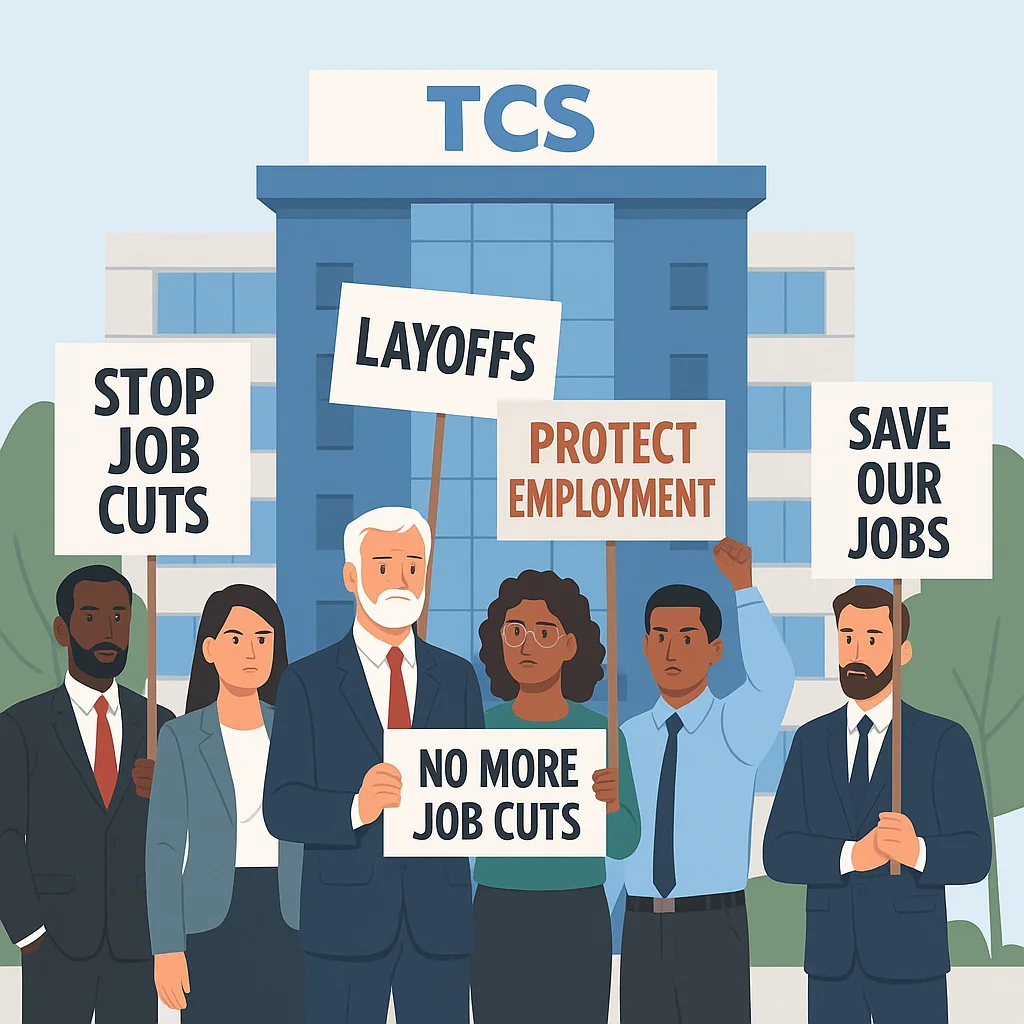The Indian IT services industry, known globally for its scale and talent pool, finds itself in the spotlight once again — this time not for innovation or expansion, but for workforce-related tensions. Tata Consultancy Services (TCS), one of the country’s largest IT services companies and a symbol of corporate stability, is facing protests and backlash from employees over reported layoffs.

While restructuring and workforce optimization are not new in the corporate world, the TCS layoffs protest reflects deeper anxieties in India’s tech sector. Employees are raising concerns about sudden notices, lack of transparency, and the impact on livelihoods. Let’s break down what’s happening, why it matters, and how it might shape the IT employment landscape.
Table of Contents
The Background: Why Layoffs at TCS?
TCS employs over 600,000 people and is considered one of the safest companies to work for in India. Historically, it has been praised for steady job creation even during global downturns. However, recent reports suggest the company has initiated layoffs across departments, citing performance issues and business realignment.
Industry analysts argue that companies, including TCS, are under pressure to adapt to:
- Automation and AI adoption: Routine IT support roles are increasingly being managed by intelligent systems.
- Global macroeconomic slowdown: Clients in the U.S. and Europe, major revenue sources, are tightening budgets.
- Restructuring initiatives: Companies are focusing on efficiency and profit margins, which often translates into revisiting workforce needs.
But employees and unions claim the layoffs go beyond “performance management,” describing them as mass job cuts camouflaged under corporate jargon.
Rising TCS Layoffs Protest and Employee Concerns
Over the past few weeks, affected workers and IT employee unions have begun protesting outside TCS offices in cities like Chennai, Hyderabad, and Pune. Some of the key issues being raised include:
- Job Insecurity: Employees who believed TCS offered lifetime stability now feel blindsided.
- Performance Reviews as a Tool: Several reports suggest employees labeled as “average” in appraisals are at higher risk of termination.
- Lack of Transparency: Workers demand clarity on selection criteria and severance policies.
- Impact on Mid-Level Employees: Many of those affected are not freshers, but professionals with 8–15 years of service who find it harder to quickly secure new jobs.
Some employee rights groups have framed this as an ethical issue, questioning whether a company with TCS’s global standing should take such abrupt action without adequate transition support.
Industry-Wide Implications
The TCS layoffs protest is not an isolated event. Over the past two years, global tech companies like Google, Amazon, Meta, Microsoft, and Indian peers like Infosys and Wipro have also announced layoffs. For India’s IT workforce, however, the news hits differently because this sector has long been associated with job stability, aspirational employment, and middle-class progress.
If even TCS — the industry’s bellwether and a brand often called a “dream employer” — is resorting to layoffs, it challenges the narrative that Indian IT jobs are immune to global volatility. It also raises questions about:
- Will AI and cloud-driven transformation reduce demand for traditional IT outsourcing roles permanently?
- How should policymakers and industry bodies safeguard employee rights without hampering business competitiveness?
- Is it time for IT professionals to focus on upskilling in emerging tech like cloud, AI/ML, data engineering, and cybersecurity?
TCS’s Response
As of now, TCS has not framed the development as “layoffs” in the traditional sense. The company maintains that these are linked to annual performance reviews, where employees failing to meet expectations may be asked to leave.
From a corporate governance perspective, this is standard practice. However, critics argue that the scale of exits, coupled with the post-pandemic slowdown, suggests the company is making workforce cuts under the radar.
Meanwhile, employee unions like the Forum for IT Employees (FITE) have taken up the cause, demanding intervention from government labor bodies to ensure employees receive fair treatment, severance packages, and adequate time to transition.
Human Impact Behind the Numbers
Beyond balance sheets and press releases, the human cost of layoffs is significant. Stories emerging from affected TCS employees highlight:
- Financial strain for families dependent on a single IT income.
- Career setbacks for those in their mid-30s and 40s, where re-employment in tech is tougher.
- Psychological stress of sudden job insecurity, particularly in cities with a high cost of living like Bengaluru, Chennai, and Pune.
For many, the TCS layoffs protest is not just about retaining jobs but about dignity, fairness, and trust in an employer once seen as family.
Tcs Layoffs Protest – The Road Ahead

The protests underscore the importance of a balanced approach to layoffs. Businesses operate in competitive environments and must adapt to change, but there’s a parallel need to prioritize employee well-being. Transparent communication, reskilling programs, and fair severance terms are crucial for maintaining trust.
For employees, the situation is a reminder that continuous learning and upskilling are no longer optional. The future of IT is moving rapidly towards AI, automation, and digital transformation, and professionals must adapt to remain relevant.
For the Indian IT industry as a whole, the TCS layoffs protest could mark a turning point. The sector can no longer rely solely on cost arbitrage or traditional outsourcing. Instead, it must find ways to remain competitive while ensuring that its human resource — its greatest strength — is not left behind.
Final Thoughts
The TCS layoffs protest sends a sobering message: even giants of Indian IT are not immune to global economic pressure and technological shifts. While the company views these actions as part of performance management, employees interpret them as job cuts in disguise. The truth likely lies somewhere in between.
What’s undeniable, though, is the need for compassionate corporate policies and a stronger dialogue between companies, employees, and regulators. As India continues to position itself as the world’s IT hub, how it balances profitability with people will define whether it remains a trusted employer brand on the global stage.
At Daily Drench Arena (dailydrencharena.com), we bring readers timely updates, in‑depth analysis, and balanced perspectives on sports, technology, and current affairs. Our mission is to deliver news that informs, engages, and adds real value to everyday conversations.
Why are TCS employees protesting?
Employees are protesting because of reported layoffs, citing sudden notices, performance-based exits, and lack of transparency in the process.
Is TCS officially laying off employees?
TCS has described the exits as part of its annual performance review process. However, employee unions argue these are disguised mass layoffs.
How many employees are affected by the TCS layoffs?
Exact numbers are unclear, but employee unions suggest significant mid-level and senior staff have been impacted, beyond standard performance exits.
What is the role of unions in the TCS layoffs protest?
Unions such as the Forum for IT Employees (FITE) have called for government intervention, seeking fair severance pay and transparency in workforce cuts.
How will TCS layoffs affect the IT industry in India?
The layoffs highlight shifting demand due to automation, AI, and cost pressures. Analysts believe IT professionals must focus on upskilling to remain competitive.
